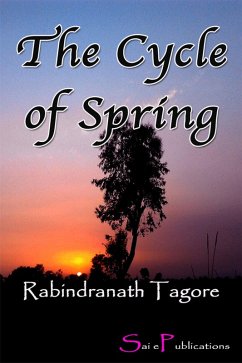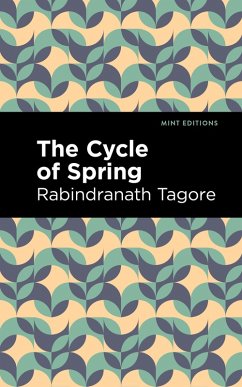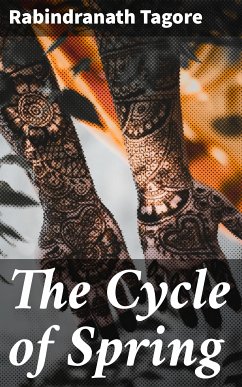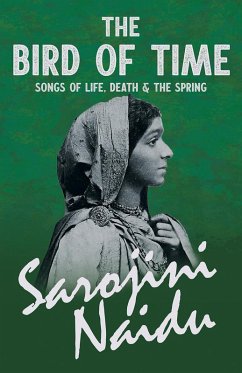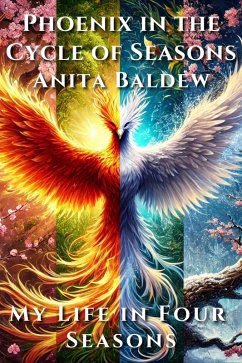
The Cycle of Spring (eBook, ePUB)

PAYBACK Punkte
0 °P sammeln!
ACT IThe Heralds of Spring are abroad. There are songs in the rustling bamboo leaves, in birds' nests, and in blossoming branches.SONG-PRELUDEThe purple secondary curtain1 goes up, disclosing the elevated rear stage with a skyey background of dark blue, on which appear the horn of the crescent moon and the silver points of stars. Trees in the foreground, with two rope swings entwined with garlands of flowers. Flowers everywhere in profusion. On the extreme left the mouth of a dark cavern dimly seen. Boys representing the "Bamboo" disclosed, swinging.Song of the BambooO South Wind, the Wanderer...
ACT I
The Heralds of Spring are abroad. There are songs in the rustling bamboo leaves, in birds' nests, and in blossoming branches.
SONG-PRELUDE
The purple secondary curtain1 goes up, disclosing the elevated rear stage with a skyey background of dark blue, on which appear the horn of the crescent moon and the silver points of stars. Trees in the foreground, with two rope swings entwined with garlands of flowers. Flowers everywhere in profusion. On the extreme left the mouth of a dark cavern dimly seen. Boys representing the "Bamboo" disclosed, swinging.
Song of the Bamboo
O South Wind, the Wanderer, come and rock me, Rouse me into the rapture of new leaves. I am the wayside bamboo tree, waiting for your breath To tingle life into my branches.
O South Wind, the Wanderer, my dwelling is in the end of the lane. I know your wayfaring, and the language of your footsteps. Your least touch thrills me out of my slumber, Your whisper gleans my secrets.
(Enter a troop of girls, dancing, representing birds.)
Song of the Bird
The sky pours its light into our hearts, We fill the sky with songs in answer. We pelt the air with our notes When the air stirs our wings with its madness. O Flame of the Forest, All your flower-torches are ablaze; You have kissed our songs red with the passion of your youth. In the spring breeze the mango-blossoms launch their messages to the unknown And the new leaves dream aloud all day. O Sirish, you have cast your perfume-net round our hearts, Drawing them out in songs.
(Disclosed among the branches of trees, suddenly lighted up, boys representing champak blossoms.)
The Heralds of Spring are abroad. There are songs in the rustling bamboo leaves, in birds' nests, and in blossoming branches.
SONG-PRELUDE
The purple secondary curtain1 goes up, disclosing the elevated rear stage with a skyey background of dark blue, on which appear the horn of the crescent moon and the silver points of stars. Trees in the foreground, with two rope swings entwined with garlands of flowers. Flowers everywhere in profusion. On the extreme left the mouth of a dark cavern dimly seen. Boys representing the "Bamboo" disclosed, swinging.
Song of the Bamboo
O South Wind, the Wanderer, come and rock me, Rouse me into the rapture of new leaves. I am the wayside bamboo tree, waiting for your breath To tingle life into my branches.
O South Wind, the Wanderer, my dwelling is in the end of the lane. I know your wayfaring, and the language of your footsteps. Your least touch thrills me out of my slumber, Your whisper gleans my secrets.
(Enter a troop of girls, dancing, representing birds.)
Song of the Bird
The sky pours its light into our hearts, We fill the sky with songs in answer. We pelt the air with our notes When the air stirs our wings with its madness. O Flame of the Forest, All your flower-torches are ablaze; You have kissed our songs red with the passion of your youth. In the spring breeze the mango-blossoms launch their messages to the unknown And the new leaves dream aloud all day. O Sirish, you have cast your perfume-net round our hearts, Drawing them out in songs.
(Disclosed among the branches of trees, suddenly lighted up, boys representing champak blossoms.)
Dieser Download kann aus rechtlichen Gründen nur mit Rechnungsadresse in A, B, BG, CY, CZ, D, DK, EW, E, FIN, F, GR, H, IRL, I, LT, L, LR, M, NL, PL, P, R, S, SLO, SK ausgeliefert werden.




